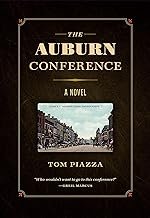The Best Books of 2023: Historical Fiction!
/Our block of genre fiction eases into our upcoming block of nonfiction with that time-honored gateway between the two, historical fiction, one of my favorite kinds of reading. Of course, there's also an increased tension involved: for more than a century, one of the most familiar charges leveled against historical fiction has been the venial sin of anachronism, of shoe-horning the present into the past. And given how ideologically strident the 21st century is, this makes the specter of anachronism all the more worrying – the mind imagines Genghis Khan as a modern American fascist or Augustus Caesar as nonbinary and neurodivergent – but readers can be reassured: the year's historical fiction was not only largely free of Twitter posturing but also largely excellent. These were the best of them:
10 The Midnight News by Jo Baker (Knopf)
Jo Baker, the author of the excellent Longbourn, here turns to 1940 and war-torn London, where a young woman is holding down her job and doing her best to muddle through the hardships of the Blitz when she slowly comes to think there's a danger lurking in the street shadows that's specifically targeting her. It's as taut and gripping as the best of this author's work.
9 Flags on the Bayou by James Lee Burke (Atlantic Monthly Press)
Burke is famous of course for his long-running series chronicling the adventures of his gun-toting superman Dave Robicheaux, but as has already been mentioned in this year's list-roundup, it's often very rewarding when the author of a long series strikes out into different territory, as Burke so wonderfully does here, crafting a moody and atmospheric action drama set in Civil War-era Louisiana in 1863.
8 The Auburn Conference by Tom Piazza (University of Iowa Press)
Undoubtedly the strangest entry on our list this year, this novel by Piazza imagines a stunning gathering in 1883 in upstate New York – a writers' conference attended by Herman Melville, Mark Twain, Frederick Douglass, Walt Whitman, Harriet Beecher Stowe, and a few other exceedingly unlikely name-recognition titans of American literature. Piazza makes such an antic, readable joy of it all that all but the most stubborn reader will willingly suspend their disbelief.
7 The World and All It Holds by Aleksandar Hemon (Farrar, Straus and Giroux)
Hemon's deft and oddly empathetic novel kicks off with the assassination of Franz Ferdinand in Sarajevo in 1914 and hurls his main character, an unassuming apothecary, into the firing line of the trenches – and into the arms of the lover who will change his life. Hemon pulls this slipshod narrative together with a good deal of skill.
6 The Princess by Wendy Holden (Berkley Books)
Of course, we don't always like historical fiction just because we agree with it, and if any entry on our list underscores this, it's Wendy Holden's hilariously partisan but nonetheless fantastic dramatization of the inner life and outer tribulations of Princess Diana. Holden does every bit as good a job bringing the House of Windsor to life as she displayed in her equally-winning previous novels, The Duchess and The Royal Governess.
5 Sparrow by James Hynes (The Overlook Press)
This novel by Hynes is set in a Spanish brothel on the outskirts of the Roman Empire and stars a young slave boy who's called Sparrow and who's being raised in a patchwork but loving way by the staff and ladies of the brothel. Hynes has an array of adventures in store for Sparrow, but the real draw of the book is its cast of wonderfully-drawn characters, most of whom very much aren't the type to appear in most Roman historical fiction.
4 The Temple of Fortuna by Elodie Harper (Union Square & Co)
This quality – a well-drawn cast of characters from the ragged outer edges of Roman society – is likewise prominent in this concluding volume of Harper's fantastic trilogy set in and around a brothel in Pompeii in AD 79, with all their dramas and conflicts coming to various conclusions in the shadow of the biggest conclusion of all: the eruption of Vesuvius.
3 Sally Brady’s Italian Adventure by Christina Lynch (St. Martin’s Press)
Lynch's novel about a boisterous gossip columnist trapped in Italy during the Second World War starts off seeming like a fairly conventional madcap adventure story full of oversized characters and melodramatic dangers. But as the irrepressible Sally Brady experiences more and more of the war's darkest sides, a different and even more wonderful narrative of indomitable spirit.
2 Wolves of Winter by Dan Jones (Viking)
Historian-turned-novelist Jones here presents the sequel to his popular debut, Essex Dogs, in which a brutal band of brother English mercenaries are part of the invasion of Normandy in 1346. Jones knows exactly what he's doing in this sequel: more of the same. There's hilarious dialogue, witty cinema-ready characters, and heaping helpings of breakneck violence as our flawed heroes hack their way from one adventure to the next.
1 The Glutton by AK Blakemore (Scribner)
– This, one of the strangest and certainly the best historical novels of the year, is a weirdly beautiful tale of intensely ugly things, is set in 18th-century France and tells the story of Tarare, the legendary Glutton of Lyon, whose hungers were allegedly endless. Blakemore takes that infamous story and turns it into a lyrical and moving exploration of all kinds of deviance, with echoes of Patrick Suskind's Perfume and a quirky genius all its own.










